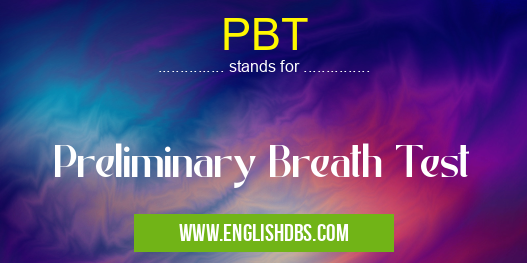What does PBT mean in POLICE
In governmental terms, PBT stands for Preliminary Breath Test and this type of test is mainly used by law enforcement officers to determine if someone is driving under the influence (DUI) of alcohol. This type of test is usually given on-site during an accident or traffic stop, and involves using an alcohol measuring device known as a breathalyzer. The results from this initial test are then used to decide whether or not further testing should be conducted such as blood or urine tests. Depending on the state or jurisdiction in which you live, these tests may also be admissible evidence in court proceedings if necessary.

PBT meaning in Police in Governmental
PBT mostly used in an acronym Police in Category Governmental that means Preliminary Breath Test
Shorthand: PBT,
Full Form: Preliminary Breath Test
For more information of "Preliminary Breath Test", see the section below.
» Governmental » Police
What Does PBT Mean in Governmental?
Essential Questions and Answers on Preliminary Breath Test in "GOVERNMENTAL»POLICE"
What is a Preliminary Breath Test (PBT)?
A Preliminary Breath Test (PBT) is a roadside breathalyzer test used to determine whether an individual’s blood alcohol content (BAC) is above the legal limit. The test results are not legally admissible evidence in court and are used only as a basis for further investigation or, in some cases, to assess sobriety.
How reliable are PBTs?
PBTs are generally considered to be reliable tools for detecting the presence of alcohol in the bloodstream, although they may not provide accurate measures of an individual’s BAC at the time of testing. Therefore, they should be used as one part of a comprehensive approach to determining an individual's impaired driving status.
Does refusing a PBT have any legal implications?
While refusal to take a PBT does not itself constitute grounds for criminal charges, it may provide law enforcement officers with additional probable cause for arresting individuals suspected of impaired driving. In states that allow implied consent laws, refusal to submit to a breath test may also result in license suspension and other legal penalties.
Who administersPreliminary Breath Tests?
Police officers trained in administering PBTs typically administer them on the scene during traffic stops or on-site investigations into potentially impaired drivers. Generally speaking, individuals must comply with officer requests to take a PBT unless there is sufficient reason not to do so.
What qualifications do police officers need before administering PBTs?
Police officers must undergo specialized training in order to administer PBTs accurately and consistently. This training includes instruction on administering breath tests, interpreting results, and understanding potential legal implications related to them.
Are there any circumstances under which an individual can refuse a PBT?
Yes - under certain circumstances an individual may lawfully refusea preliminary breath test without fear of repercussion from law enforcement authorities. These include instances where the officer has insufficient probable cause to administer such a test or if the results will not be admitted as evidence in court.
Is it possible for these tests to produce false positive results?
It is possible that Preliminary Breath Test devices can produce inaccurate readings due to operators mistakes or equipment malfunction. This could result in false positives and should be taken into consideration when assessing an individual’s sobriety or trustworthiness of their BAC readings.
How accurate are Preliminary Breath Tests?
The accuracy of Preliminary Breath Tests depends largely on factors such as calibration settings and operator proficiency when administering the test. Generally speaking, PBTs are considered relatively accurate compared with more precise chemical tests administered by medical professionals. However their results cannot be definitively used as admissible evidence in court proceedings.
PBT also stands for: |
|
| All stands for PBT |
